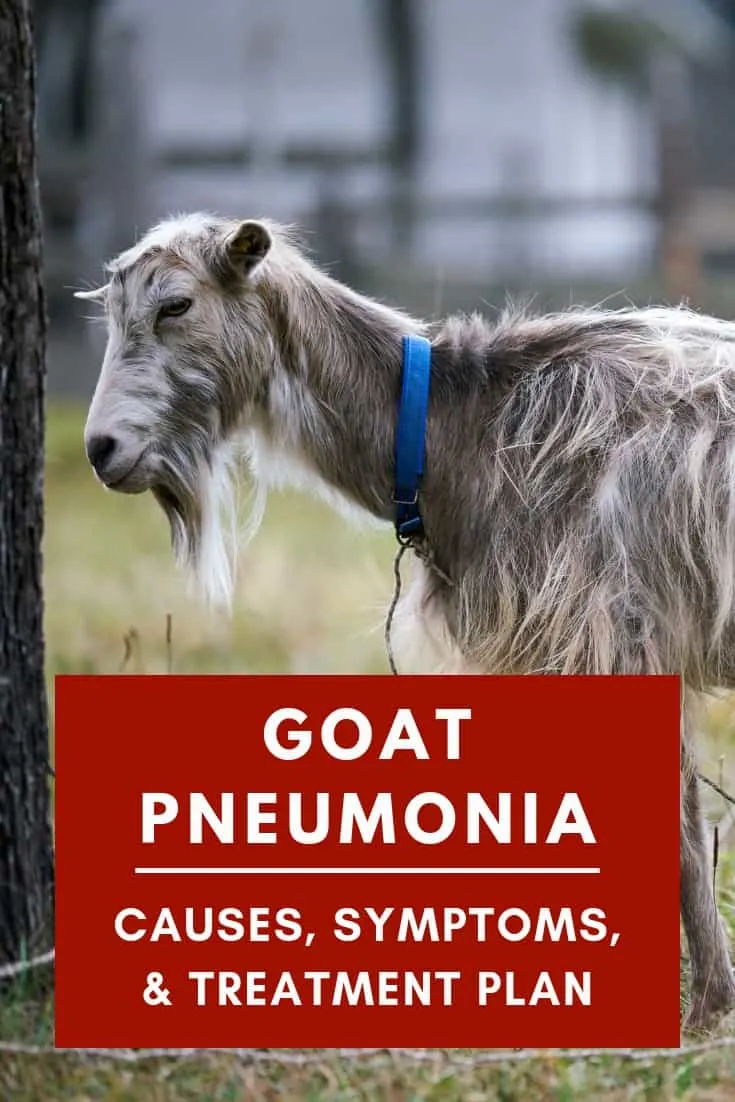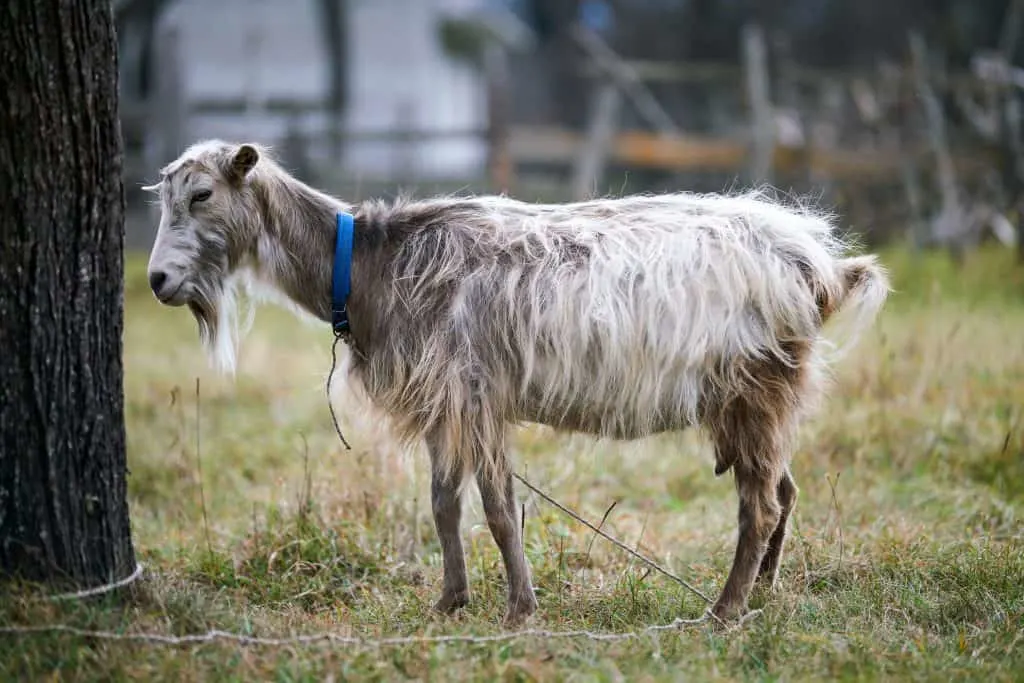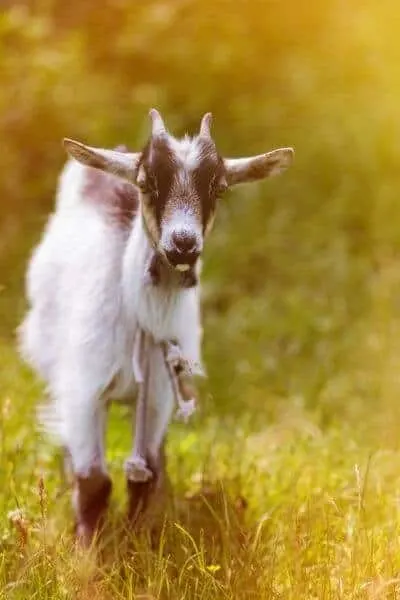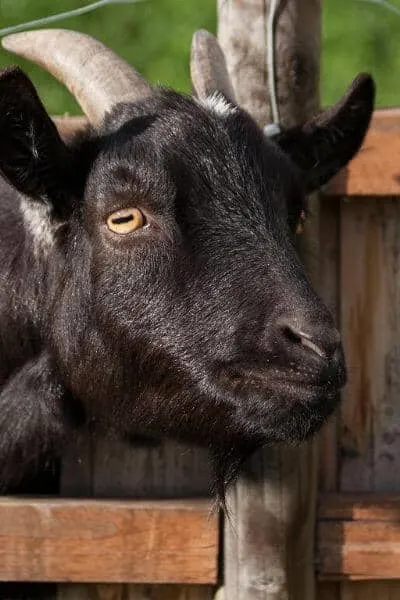This is what having the correct goat information and knowledge can do for your goats. This could be you. This could be your Annabelle. This can be your outcome.
Happy Monday Delci ! Just a quick update….our Annabelle (who had pneumonia) is doing well!! Jumping and running like her old self ! Can’t thank you enough!! I have watched almost all your videos on goats…and have learned A LOT !! Gotta get to work…but just wanted to let you know…how much happiness you have brought to this “new goat family” from Iowa !!
Goat pneumonia is a leading killer among goats. This post helps round out the information on my raising goats resource page. You need to be prepared and to know what causes pneumonia in goats, the symptoms that follow, and the treatment plan that needs to begin immediately.

What is Pneumonia in Goats?
You can watch my experience and treatment and goat pneumonia information in the video below:
If you like this information, my YouTube channel is full of even more goat information. Please click this link: Delci | A Life of Heritage and subscribe! You can also click this link to watch this information on YouTube: Goat Pneumonia Video on YouTube
As I walked out to the goats and breathed in the cold air through my nose, my nose hairs tingled and froze. I expected to walk out to my goats, feed them, love on them, milk, and go about my day. But I immediately knew that something was wrong when my spunky Faith, didn’t push everyone out of the way to get to me.
Uh oh…what was going on? I worked my way visually and physically through the symptoms and immediately knew I was dealing with pneumonia. And after I took her temperature and it was 97°F, I knew I had to act quickly. I immediately ran inside and got my medicine cabinet. Pneumonia in goats is the result of the lungs becoming inflamed and can cause serious damage and even death very quickly.
Do goats get pneumonia?
Yes, goats do get pneumonia. In fact, it is one of the leading killers of goats a year. Worms and pneumonia kill more goats than anything else.
Why do goats get pneumonia?
That is a really good question. There are several reasons that goats can get pneumonia. In my area, in Montana, we can have crazy swings in temperature. The week Faith got sick, we had had beautiful warmish days, and then it swung down to low single digits with a feels like temperature in the negatives. Out of all the ruminants, goats have the hardest time regulating their temperature. Kids have an even harder time. So if you live in an area that has wide swings in temperature, your goats will be at risk for pneumonia.
Here are the reasons goats get pneumonia:
-
- Wide swings in temperature, high humidity, and excessive moisture
- Worms
- Lung parasites
- Bacterial, viral, and parasitic infections
- Unhealthy body condition
- Crowded, overfeeding, dirty environments
- Unprotected from the elements like wind, rain, or snow
- Immuno-compromised goat
- Transportation stress
- Viral infections
- Prior bacterial infections
- Sudden environmental changes
Get the free Goat Pneumonia Treatment Plan Here and put it with your goat records: Goat Pneumonia Treatment Plan
What are the symptoms of pneumonia in goats?
When I found Faith in an obvious state of discomfort what did I see? How did I diagnose that it was pneumonia that I was dealing with?
Before I explain that, I want to tell you what I found years ago when I went out one morning to do chores. The previous fall, I had gotten a new buck and had only had him a few months. He had bred my does that fall but at the beginning of the new year, I went out to feed and found my new buck, cold and stiff. Overnight he had died. By all appearances the night before, he looked and acted completely fine.
But that’s how interstitial pneumonia works. In as little as 4 hours, it can kill a goat. Overnight.
These are the symptoms of pneumonia in goats:
- High fever (104°-106°F)
- Low temperature (falls below 100°F)
- Not eating
- Standing off by itself
- Tail and head down
- Lay down, moan, and get up because of pain (fluid filling lungs)
- Down and unable to get up (fluid-filled lungs)
- Nasal Discharge
- Difficulty breathing
- Moist, painful cough
- Depression
What types of pneumonia in goats is there?
Interstitial Pneumonia
Interstitial pneumonia in goats is the most common and the most deadly. You will need to act quickly with treatment to bring your goat out of this. Interstitial pneumonia is inflammation of the lung that involves the mesh of lung tissue (alveolar septa) rather than the air spaces (alveoli). Interstitial pneumonia can be caused by bacteria, viruses, and worms.
Bacterial Pneumonia
The most common bacterial pneumonias are Pasteurella and Mannheimia.
→ Pasteurella Pneumonia
Pasteurella is a bacterial organism that can cause serious damage to your goats. If you want to read about how 15 excellent and brilliantly cared-for bucks died slowly over a period of time from this, visit this site: Pasteurella in Herd. Pasteurella will create enzymes that grow microabscesses. These microabscesses will slowly turn into big abscesses. And then they will turn septic and kill the goat.
→ Mannheimia Pneumonia
Healthy animals can carry M. haemolytica in their nasal passages but when they are stressed it can go lower into their respiratory tract where it can cause a lot of damage.

Viral Pneumonia
→ Progressive Pneumonia
Progressive pneumonia is a chronic disease in both sheep and goats.
→ CAE
CAE (caprine arthritis and encephalitis) is a virus closely related to progressive pneumonia but affects the nervous system and joints but can induce pneumonia.
Parasitic Pneumonia
Pneumonia can come about from infection caused by worms. Lungworms can cause problems and worms can travel from the intestinal tract to the lungs as well. This type of pneumonia affects a different portion of the lungs than the bacteria and viral pneumonia.
Aspiration Pneumonia
Aspiration pneumonia can also be called foreign-body pneumonia, inhalation pneumonia, or gangrenous pneumonia. It happens when a foreign object is inhaled and causes a pulmonary infection that causes inflammation and necrosis. The severity will depend on how much was aspirated, how far it dispersed, and what was inhaled.
This can happen during drenching or giving oral medications. This happens more often when giving mineral oil.
Tips on drenching goats:
- Give the drench only as fast as the goat can swallow
- Take extra care and be careful when the tongue is out, the goat is bleating or the head is held very high up
Is pneumonia in goats contagious?
Pneumonia can be contagious but it depends on what type of bacteria or virus is present. Sometimes a goat can catch pneumonia from the secretions of an affected goat. But a goat can actually “catch” pneumonia from themselves as well. They naturally have bacteria in their noses but if they are sick or if their health becomes compromised in any way, that bacteria increases and then will invade their lungs causing pneumonia. Most viral diseases of the respiratory tract are contagious.
How to keep track of the health in your goat herd
You need to keep accurate records of your goat herd from year to year and when you give treatment or shots. It is impossible to remember from year to year what’s happened to each goat and what you gave them when. So keeping track of all your records in a goat health and information binder is imperative.
You are organized. You are knowledgeable. You are proactive. This is how. Click below to get this binder in your hands to avoid common errors that affect your goat's health. These records are your freedom and your goat's optimal health.Goat Essential ↓
Goat Management Binder
Treatment of pneumonia in goats
If you suspect your goat has pneumonia, this is what you should do:
- Take their temperature. Diagnose properly. And if pneumonia is the cause of their sickness, begin treatment below.
Treatment plan:
- BANAMINE. The high temperature must be brought down immediately. This will also alleviate any pain and inflammation they are experiencing.
- Dosage: IM 1cc per 100 pounds. Newborns/young kids: one-tenth to two-tenths of a cc
- ANTI-BIOTIC. Nuflor, Nuflor Gold, Excenel RTU or Draxxin.
- Nuflor: 18-gauge needle with a Luer-lock syringe. 3cc per 100 pounds body weight (IM) for 5 consecutive days.
- Nuflor Gold: 18-gauge needle with a Luer-lock syringe. 6 cc’s per 100 pounds of body weight (IM) for 5 consecutive days. Provides some protection against mycoplasma that Nuflor doesn’t have. Newborn kids: a minimum dosage of 1/2 cc.
- Excenel RTU: 18-gauge needle. 3 cc per 100 pounds of body weight (IM) for 5 consecutive days. The second dose is given 12 hours after the first and the next four doses are given 24 hours after the last. Newborns/young kids: great option. The minimum dosage for newborns is 1/2 cc.
- Draxxin: More expensive than other alternatives. 1 cc per 100 pounds body weight (IM) for 5 consecutive days.
- Penicillin: 18-gauge needle. 5 cc per 100 pounds body weight (SQ over ribs) for 5 consecutive days.
- LA200: 18-gauge needle. 5 cc per 100 pounds body weight (SQ over ribs) for 5 consecutive days.
- Always have Epinephrine on hand when giving injections just in case of anaphylactic shock.
- ROBITUSSIN DM: Only if present, chest congestion can be relieved by giving Robitussin DM.
- Dosage: twice daily at a dosage of approximately six ccs per 100 pounds body weight.
- ELECTROLYTES: If the goat is dehydrated, replenish fluids with electrolytes by orally drenching the goat. In a 24 hour period, a 100-pound goat needs 1 gallon of fluids. This will be given in small amounts throughout the day. But great care must be taken so that the goat does not aspirate the fluids into its lungs.
- THIAMINE: Thiamine must be given if the goat is off feed. Their brain function depends on it and their rumens produce it. But will stop producing it if they are off feed.
- Dosage: 4 ccs per 100 pounds of body weight (IM or SQ every 12 hours).
- PROBIOTICS: After any round of antibiotics replenish a goat with probiotics. These probiotics work great: Probios
- VACCINATE: Consider vaccinating your herd if pneumonia is a problem. Presponse HM Pneumonia Vaccine by Beringer Ingleheim. Jeffers carries this over the counter from Jeffers Livestock.
- Dosage: 1 cc SQ for goats under 60 pounds and 2 ccs for goats over 60 pounds. Repeat dosage 4 weeks later. And then annually after that.
- HEALTH AND HOUSING: Always provide dry, clean pens and provide areas that are out of the weather. Your goats need continual access to excellent hay and mineral. They will need to be kept worm-free. A healthy goat will be able to fight off sickness much more readily than an unhealthy goat.
After watching the video on this page, reading through the information, and downloading the goat pneumonia treatment plan, do you feel a little more capable of helping your goat if they get sick or are sick right now?
I hope so! Just remember you must always watch very carefully the behavior of your goat so you can catch any sickness quickly.
Don’t forget to get, download, and print out the pneumonia treatment plan:
Goat Pneumonia Treatment Plan
You can find further information here:



Jennifer
Wednesday 27th of September 2023
yesterday my skinny goat was out of the pen and got wet by the heavy rain. I saw her in the afternoon and fed her because she can't stand that's why she starved. she was shivering in cold and this morning she refused to eat. She's still lying down and can't be able to stand. what should I do to her?
Delci Plouffe
Wednesday 29th of November 2023
First, always take their temperature. If it is cold, they need to be propped up so they are upright and warmed up. If they are too warm, they'll most likely need an antibiotic. But there are some down goat recipes that you can try to see if she'll eat. Keep her hydrated.
Laura McKinney
Saturday 11th of September 2021
Delci, I bought the binder and have appreciated your help. My premature orphan goat, born in March seems to have aspirated something and has pneumonia. She has had fever up to 107 then down to 103 or 102.6 for 13 days. Two vet visits, two antibiotics and vitamin shot, 1 drench and she is suffering as she kneels on her front legs. We are heartbroken but today, I think we need to let her go. I don't know how to drench her with the tubing- we gave her squirt of goat drench and probiotics with her shot the last two day and some molasses water but she is not doing well. When do we let her go? I am so sad but I don't want to make every moment agony.
Delci Plouffe
Friday 25th of March 2022
I am so very sorry to hear this. Sometimes when a goat gets sick, there really is no point of return. And it is so very hard to let them go. I am so so very sorry.
Shawn Morris
Monday 4th of January 2021
I just happened upon your video yesterday at lunch. I went out to check my goats and let them out of their dry lot about 3 hours later. The two week old kids weren’t with the herd. They were bundled under the heat lamp. The girl was hunched and just didn’t look right. Everything has been super wet and muddy. Took her temp and it was 98.6. Took her in the house and warmed her up, dosed her with PCN. Your video saved her life. She is doing great this morning. Thank you.
Delci Plouffe
Wednesday 6th of January 2021
This just absolutely made my night! I'm so happy that your little one is doing good! What a blessed relief! Thank you so much for sharing!
Sulmain
Friday 4th of September 2020
I would like to have questions. I have a goat that had gangrenous mastitis. It was treated and cured, but the udder fell on its own. The appetite was open and good, but it seemed very thin. Can I find you a solution?
Stephen Bulus
Wednesday 29th of April 2020
Thanks for the update